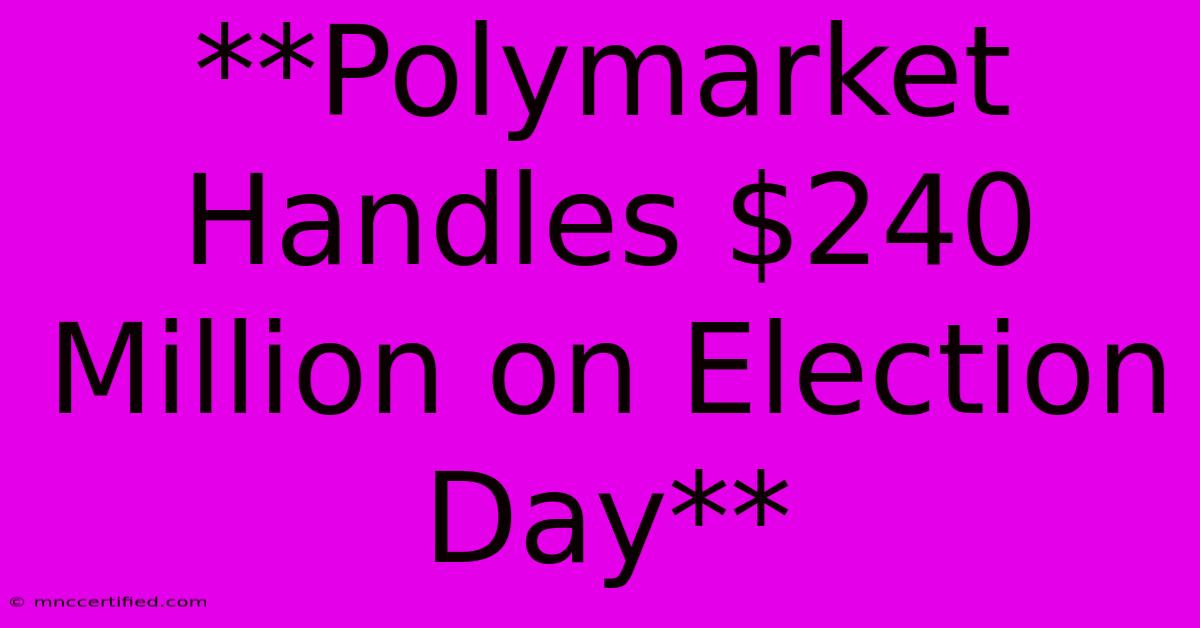**Polymarket Handles $240 Million On Election Day**

Table of Contents
Polymarket Handles $240 Million on Election Day, Demonstrating Growing Interest in Prediction Markets
The 2022 midterm elections saw a surge in activity on Polymarket, a platform that allows users to trade on the outcome of real-world events. The platform reported $240 million in trading volume on Election Day, a significant increase from previous years, indicating a growing interest in prediction markets as a tool for political forecasting and engagement.
A Surge in Political Prediction Markets
Polymarket, which operates as a prediction market, enables users to buy and sell contracts that pay out based on the outcome of real-world events. This allows users to express their opinions on events, such as elections, and profit if they accurately predict the results.
The platform's impressive Election Day volume reflects a larger trend in the growing popularity of prediction markets. As the world becomes increasingly reliant on data and analytics, platforms like Polymarket provide a unique and engaging way for individuals to participate in forecasting and understanding events.
The Appeal of Polymarket
Polymarket's appeal lies in its user-friendly interface and the ability to engage with a diverse community of traders. Users can participate in various markets, covering topics beyond just politics, such as:
- Technology: The future of AI, blockchain technology, and other advancements.
- Economics: Interest rates, inflation, and other economic indicators.
- Entertainment: The outcome of major sporting events, award shows, and celebrity news.
The Future of Prediction Markets
The success of Polymarket and similar platforms suggests that prediction markets are becoming increasingly mainstream. As these platforms continue to grow, they are likely to play a more prominent role in shaping the future of political forecasting, market analysis, and public opinion.
While prediction markets offer a unique and exciting opportunity to engage with real-world events, it's important to remember that they are not without their limitations.
- Regulatory uncertainty: The legal landscape surrounding prediction markets is still evolving, creating some ambiguity for both users and platforms.
- Volatility: Prediction market prices can be highly volatile, especially during major events like elections.
- Information asymmetry: Some users may have access to insider information that gives them an unfair advantage in trading.
Conclusion
Despite these challenges, the growing popularity of Polymarket and other prediction markets suggests that these platforms have the potential to revolutionize the way we think about and engage with real-world events. The platform's success on Election Day highlights its growing appeal and its potential to play a more significant role in our digital world.

Thank you for visiting our website wich cover about **Polymarket Handles $240 Million On Election Day**. We hope the information provided has been useful to you. Feel free to contact us if you have any questions or need further assistance. See you next time and dont miss to bookmark.
Featured Posts
-
What Insurance Does Frantz Eye Care Accept
Nov 07, 2024
-
Live Stream Barcelona Vs Red Star Belgrade November 6 2024
Nov 07, 2024
-
Trevor Sorbie Styling Legends For Decades
Nov 07, 2024
-
Predicted Barcelona Xi Vs Crvena Zvezda Champions League
Nov 07, 2024
-
Doj To Review Trump Case Resolutions
Nov 07, 2024